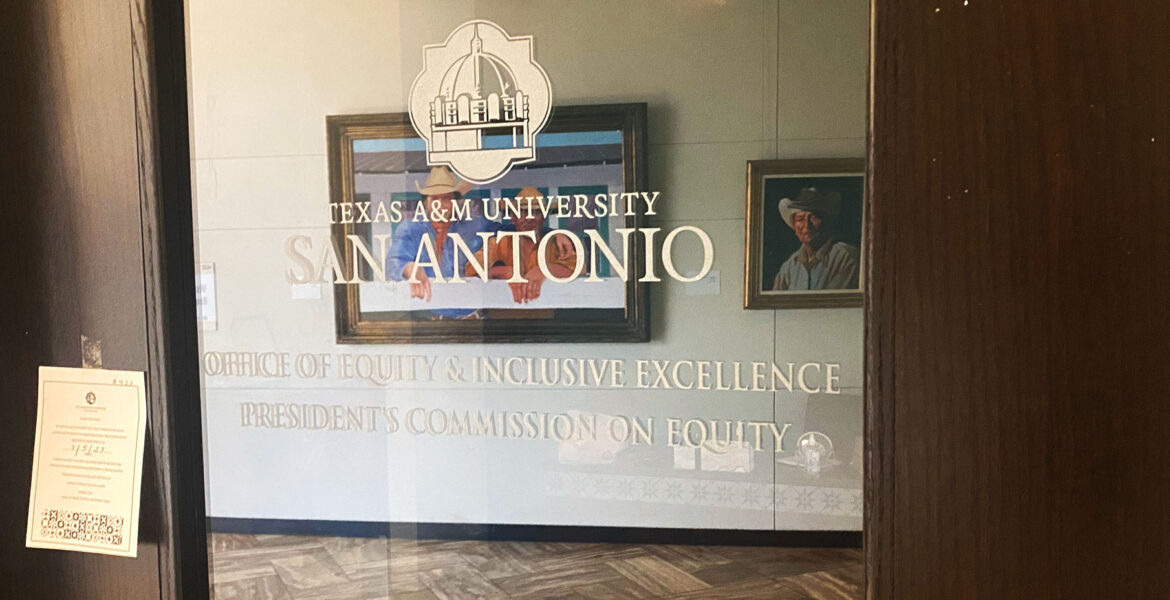A new state law that prohibits diversity initiatives at public universities could make students feel less welcome and included, said Emily Naasz, a government and political science lecturer at Texas A&M University-San Antonio.
Senate Bill 17, signed by Gov. Greg Abbott June 14, prohibits universities from having offices of diversity, equity and inclusion. The bill also bans using the language and ideologies of diversity, equity and inclusion in the hiring and training practices of institutions.
The law will go into effect Jan. 1, 2024, but universities must submit a report certifying the institution’s compliance with the law by Dec. 1.
Naasz, who says the law has stymied some of her own research, spoke with The Mesquite July 3.
Q: What is the first thing A&M-San Antonio has to do to be in compliance with the regulations of SB-17?
A: A lot of universities are scrambling — maybe scrambling is too strong of a word — but they’re still trying to figure out what implementation will actually look like. Part of the language of the bill says that anyone who works in a DEI office won’t necessarily be let go, but the institution should do the best they can to find them a comparable job for comparable pay. That’s kind of the only guidance that we get.

Our university is guided by the A&M System, so they’ll be the ones to provide guidance, but practically we can expect to see much less programming from our DEI office.
It’s actually really, really relevant to the conference I was just at.
Naasz was previously in Ireland at a research conference.
We were trying to see about incorporating some of that research about the conflict in Northern Ireland. We were going to work with the DEI office here on campus and set up like a borderlands sort of discussion, and that’s no more. Just your perfectly average, generic professor like me is going to be impacted, because that funding and support for this research – which is only tangentially related to DEI – it’s gone.
A&M-San Antonio’s Office of Equity and Inclusive Excellence is home to the President’s Commission on Equity, which was founded under Cynthia Teniente-Matson during her tenure at the university. The commission contains four committees chaired and membered by nominated faculty and staff from different departments and colleges of A&M-San Antonio. The commission sponsors research and programs to “provide institutional and educational models and resources to create a just and equitable environment” at the university.
The Mesquite has reached out to the Office of Equity and Inclusive Excellence and the Office of of Research and Health Sciences for a comment, but they have not responded.
I don’t necessarily do race or ethnic politics in my work, but it has that much of an effect. I do conflict studies, and [the bill] has already impacted that program.
If I could just editorialize, it makes me sad. There’s so much to unpack with DEI. It’s not just race and ethnic politics; it’s LGBTQ folks, it’s veterans, it’s women, it’s first-generation students, it’s students from lower-income families. DEI is supposed to make all of those different students feel welcome and included. It’s not just crunchy politically correct talking points. I mean, this is real — students who don’t necessarily feel welcome are not as likely to succeed, continue with their education, graduate or become productive members of the workforce. We don’t even realize really what kind of reverberations this will have.
That’s kind of a long-winded response to say “we don’t know,” but it’s not going to be good.
Q: You mentioned that the bill is something that makes you sad. What have been the conversations that you’ve had with other faculty here or at other institutions?
A: I don’t want to speak for other faculty members or professors, but it’s a sad day for all of us. Because we do collectively want to see you guys succeed – we want our students to succeed. If they’re not being supported by DEI initiatives and programming, you know, there’s only so much you can do.
Q: Is there any gray area that exists between what the law says you can and cannot do? Could people try to circumvent certain language or find loopholes?
A: It’s hard, because it’s too new and too fresh. I don’t know what kind of teeth the auditors will have. The language of the bill says that if you’re to be in noncompliance you have 180 days to correct it, otherwise you lose funding and potentially faculty found in noncompliance of the bill could face termination. That’s a cause for concern.
I don’t know how much gray area or maneuverability there is. I know there’s a lot of clever folks and activists who will do whatever they can to be in compliance with the law but still make sure that DEI initiatives are holding fast.
It’s such an open-ended and vaguely worded bill that we don’t really know where the maneuverability is at this point, unfortunately.
If not in compliance, universities could face losing state funding and being fined up to $1 million. Staff and faculty who are found to be violating the statute could face unpaid leave and termination.
“The DEI offices might be closed, but that doesn’t mean that student organizations can’t come together and lean on each other and support each other. I wish I had a magic solution. Keep trying, keep pushing and eventually we’ll make progress.” – Emily Naasz, political science lecturer at Texas A&M University-San Antonio
Q: A lot of the sanctions listed in the bill are against administration and faculty, but will the bill directly impact students? Could it mess with admissions and students’ standing at their institution?
A: It’s supposed to not. So the bill language itself has said that it’s not supposed to impact student recruitment or instruction in the classroom.
Tinfoil hat time, this is just my own perspective here, if DEI programs are supposed to help with student retention and you’re gutting those programs – that’s going to have reverberations on student recruitment.
The language of the bill says it’s not supposed to impact students or student organizations, but, you know?
Q: Here’s a super specific hypothetical: the Campus Activities Board puts on a “diversity” farmers market. Could someone make the argument that they shouldn’t put on those kinds of events?
A: Well, people have that language now to say, “Well, hold on, this is trying to promote diversity, equity and inclusion” even if it’s not. They have that mechanism and infrastructure to weaponize those organizations and kinds of events. I hope it wouldn’t, but again, the support [to attack those groups and events] is there now.
Q: You said that your colleagues feel the same way you do. Have you seen any support for the bill?
A: No. Not in my group and circles. Not to “both-sides” this, but the language of the bill says that it’s supposed to level the playing field, and it’s supposed to remove the politicization of race. But, I don’t necessarily believe that.
Q: To be clear, this bill would only affect public institutions and not private?
A: That’s kind of a gray area too. The language of the bill just says “universities.”
Q: Last question here. What can students concerned about the impact of the bill do to keep their heads above water or try and have the best academic experience that they can while still feeling like they’re welcomed and their identities matter?
A: There’s a few different things practically speaking: contact your Texas state legislators, let them know what you think. Contact Gov. Greg Abbott, Lt. Gov. Dan Patrick, etc.
Then I’d say, keep your chin up. From my own echo chamber, it’s not a widely supported bill. Faculty members are not generally in support of this. Understand that you have that understanding from us.
Faculty members, our hands are tied; there’s only so much we can do. I think it’s going to have to come from students. I hate to put that burden on you guys; you’ve got so much going on. It’s got to be a real grassroots support. I’d say be kind to one another. The DEI offices might be closed, but that doesn’t mean that student organizations can’t come together and lean on each other and support each other. I wish I had a magic solution. Keep trying, keep pushing and eventually we’ll make progress.







